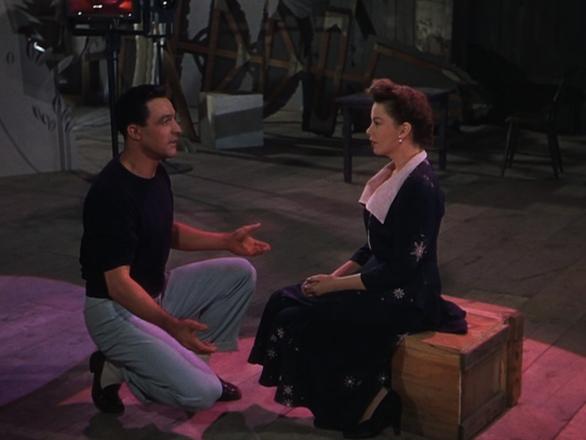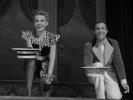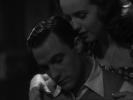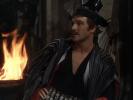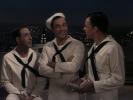Reviews
Charles Walters
USA, 1950
Credits
Review by Victoria Large
Posted on 24 August 2012
Source Warner Bros. DVD
Categories Gene Kelly
Three of Gene Kelly’s best loved and most highly respected films were released in the span of four years: On the Town in 1949, An American in Paris in 1951, and Singin’ in the Rain in 1952. All three films are sophisticated and wildly ambitious, each seeming to build on the previous film’s successes. So it’s understandable that some viewers might be slightly baffled by the other musical that Kelly starred in during this four-year period: 1950’s Summer Stock. Originally conceived as a reunion for Judy Garland and Mickey Rooney, Summer Stock is basically a retread of the kind of “let’s-put-on-a-show” pictures that Garland and Rooney used to make in the thirties and early forties, and it feels oddly hokey given the time of its release and the caliber of talent involved.
The behind-the-scenes circumstances of Summer Stock clarify matters a bit. Garland was at a particularly rocky moment in her fraught career when it came time to film Summer Stock: it was her first film after she was fired from MGM’s production of Annie Get Your Gun in the midst of personal troubles, and it was also her last MGM film before being released from her contract altogether. Summer Stock, formulaic plot and all, feels like it was intended as an easygoing comeback vehicle for its female star, and Kelly reportedly accepted his part in the film as a result of his friendship with, and professional admiration for, Garland.
One could argue that Summer Stock, with of all its attendant stories of backstage strife, represents both the best and worst of the studio system that MGM so epitomized. There’s a repellant hypocrisy in the way that MGM dealt with Garland: most accounts of her life contest that her childhood as a movie star did her a great deal of damage, feeding into her insecurities and laying the foundation for her struggles with substance abuse. (The studio doctors reportedly prescribed her a series of drugs to help her to keep up with her demanding work schedule.) Knowing that MGM would soon lose patience with a star whose difficulties can scarcely be discussed without mention of the studio’s own abuses is discomfiting indeed, and it makes watching Summer Stock a more complicated experience than it might otherwise be. There’s also the issue of Summer Stock’s predictability: it’s less about breaking new ground than it is about trying to replicate what might have worked in the past—even if that means repeating elements of story and character that both Garland and her audience had outgrown by 1950.
Yet the level of professionalism on Summer Stock is extraordinarily high, and it often makes for more than agreeable viewing, a film that’s easy to curl up with on a rainy day. Garland and Kelly are great together as always, and they get a legendary number each. The supporting cast is strong - I’m always happy to see cult favorite Hans Conreid (of 5,000 Fingers of Dr. T fame) who plays a luvvie actor here - and one senses that even if the picture itself is stagey and cornball at times, it is at least getting the best airing that it possibility could, thanks to the studio’s incredible resources in terms of both budget and - especially - talent.
Okay, the plot, in a nutshell: Garland plays Jane Falbury, a young woman who runs a farm and is engaged to Orville Wingait, the spineless and nerdy son of a local farm supply dealer. Jane’s sister Abigail, who has been in New York pursuing an acting career, unexpectedly returns home with a troupe of actors who plan to use Jane’s barn to stage their show. (Abigail volunteered the space without asking Jane’s permission.) Among the actors in the troupe is Abigail’s boyfriend Joe Ross, an actor/dancer/director (sound familiar?) played by Gene Kelly. There’s little suspense as to whether Jane will dump her lame fiancé and end up singing onstage (and in Joe’s arms offstage), but we do have some fun getting there.
For all of her offscreen struggles, Garland does plenty of fine work, even giving her all to “(Howdy Neighbor) Happy Harvest,” a song about the joys of bringing in an abundant crop that is not exactly a breakaway pop hit. (That song ends with one of Summer Stock’s most refreshingly self-aware moments: Judy lets out a little “phew” at the close of the number, as if exhausted by its strenuous cheerfulness.) She also packs tangible longing into “Friendly Star” - a lovelorn variation on “Somewhere Over the Rainbow” - and darn if she doesn’t bring a real sense of loss to the scene where she discovers that her new tractor has been totaled. Garland may outclass the material, but that doesn’t keep her from investing it with real emotion.
But of course, her best moment comes near the film’s end, during a sequence that was shot after principal photography had wrapped (thus explaining Garland’s noticeable fluctuation in weight). Dressed in a tuxedo top and high heels, peeking coquettishly out from under the brim of her black hat, Garland completely owns the screen whilst singing the old Harold Arlen tune “Get Happy.” This was the last number that Garland ever shot for MGM, and it’s a triumph, a performance so assured and stylish that, in less than three minutes, it elevates the entire film.
Garland is also excellent in her scenes with Kelly. The powerful chemistry that they share in For Me and My Gal and The Pirate is present in Summer Stock, though their romantic scenes have a greater tenderness in this, their final film as costars. As Joe Ross, Kelly plays a much gentler character than he did in his other pairings with Garland (or in the majority of his films, for that matter). They have a sweet-tempered duet, “You Wonderful You,” and an intimate dressing room scene that finds Joe massaging Jane’s rehearsal-battered feet. (The latter is more romantic than perhaps it sounds.) The two also have an energetic dance number, “The Portland Fancy,” which finds Joe coaxing Jane into an elaborate and adorable tap routine that, Summer Stock being Summer Stock, ends up offending the staid sensibilities of the attendees at the historical society’s annual country dance.
Notably, Summer Stock doesn’t have any of the dream ballets or fantasy sequences that crop up in most of Kelly’s films, particularly his work in the late forties and early fifties. We never really get off the farm in Summer Stock, so Kelly dances across a kitchen table (good thing they had a chance to clear it) in “Dig, Dig, Dig for Your Dinner,” an ode to hard work that features a bit of mugging from Kelly and his Cover Girl costar Phil Silvers as well as a lot of intricate footwork. (This number is also the only one to feature Kelly dancing a few steps onscreen with his dance assistant Jeanne Coyne, who he would marry in 1960.) The number that earns Summer Stock a firm place in the Kelly canon, however, is his solo dance to an instrumental reprise of “You Wonderful You.”
Kelly’s only partners for this routine are a squeaky floorboard and an old newspaper, with his use of the latter feeling like a shout-out to The Red Shoes, the 1948 British dance classic that helped inspire the epic ballet at the conclusion of An American in Paris. Inspired by the squeak of a floorboard and the rustle of a newspaper on a deserted stage, Kelly’s character Joe starts experimenting with sound. He becomes the tap dancer as percussionist, creating music with his feet and an impressive something out of next-to-nothing. The piece is joyful in its simplicity, and if we want to keep with the barnyard theme, it feels like gold spun from straw.
I don’t think that Kelly’s artistry can really be summarized in any single dance - his grand ambitions, wide range of interests, and multilayered persona cannot be encapsulated so neatly - but the Newspaper Dance, as it is sometimes referred to by fans, represents something essential about Kelly and about the classic musicals where he made his name. Materializing for a few perfect minutes in an imperfect film, the Newspaper Dance makes the ordinary extraordinary. It suggests that magic can happen at the most mundane of moments, so long as we’re alive to the possibility.
More Gene Kelly
We don’t do comments anymore, but you may contact us here or find us on Twitter or Facebook.



